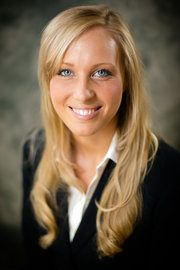The weekly TGCvocations column asks practitioners about their jobs and how they integrate their faith and work. Interviews are condensed.
 Liz Gonzalez-Christenson is a senior associate at Cathedral Consulting Group in New York, New York. Cathedral is a “Christian-centric” consulting firm, driven by technical business principles aligned with biblical principles. Liz and her husband, Gian Paul, live in Union City, New Jersey. They volunteer with Union City youth, where Gian Paul’s focus is fitness and leadership training, and Liz’s focus is financial literacy.
Liz Gonzalez-Christenson is a senior associate at Cathedral Consulting Group in New York, New York. Cathedral is a “Christian-centric” consulting firm, driven by technical business principles aligned with biblical principles. Liz and her husband, Gian Paul, live in Union City, New Jersey. They volunteer with Union City youth, where Gian Paul’s focus is fitness and leadership training, and Liz’s focus is financial literacy.
How do you describe your work?
Cathedral works with small to mid-sized businesses to grow them stronger and more valuable. As leader of Cathedral’s Family Run Business Practice, I often work with family-run businesses with multiple companies, foundations, and family assets to manage. I help families plan for the next 100 years. This is challenging due to complex short- and long-term timeframes, and it requires both technical business principles and an understanding of unique relational dynamics.
As an image-bearer of God, how does your work reflect some aspect of God’s work?
I view God as an investor. In the creation account, we see that he creates fruit trees that bear fruit with seeds to create more fruit (Gen. 1:11-13). In the Parable of the Ten Minas, Jesus says, “The kingdom of God is like . . . ” and then describes the nobleman as an investor rewarding one who invested his resources and chastising the one who buried his.
How does your work give you a unique vantage point into the brokenness of the world?
Two of my family-run business clients had comparable net worths and charitable values, but they ended up very differently. One family had three siblings working in the company until one sibling requested to be bought out. Over the course of ten years, the company doubled in size and profitability. Recently, the family needed a succession plan [fourth to fifth generation]. The siblings still working in the company requested Cathedral design the plan to bring their sibling back into the company, saying, “We want him to get the same economic value as if he never left.”
Another family has four siblings, and the fifth generation now leads the company. One sibling, the family leader, was asked to steward the company, but during the economic downturn (2008-2009), ended up cutting the other siblings out of the company. This led to a legal battle, contesting the will, and allegations of fraud. To this day, the family members refuse to speak to each other.
Jesus calls us to love our neighbors as ourselves. How does your work function as an opportunity to love and serve others?
In my work, I love my clients by giving families the succession design tools to help them be good stewards of the resources God has entrusted them. Families transition well when they understand that, as stewards, we don’t “own” anything; God owns all things (Ps. 24:1; 1 Cor. 4:7). The main difference between the two families that I mentioned was that one recognized their stewardship role and the other did not.
Is there enough evidence for us to believe the Gospels?
 In an age of faith deconstruction and skepticism about the Bible’s authority, it’s common to hear claims that the Gospels are unreliable propaganda. And if the Gospels are shown to be historically unreliable, the whole foundation of Christianity begins to crumble.
In an age of faith deconstruction and skepticism about the Bible’s authority, it’s common to hear claims that the Gospels are unreliable propaganda. And if the Gospels are shown to be historically unreliable, the whole foundation of Christianity begins to crumble.


































